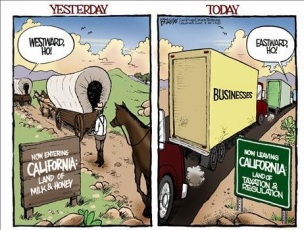June 20, 2022 by Dan Mitchell @ International Liberty
I’ve been warning for many years that California is committing “slow-motion suicide.” I discussed the not-so-golden future of the Golden State as part of a longer interview with Chile’s Axel Kaiser.
If you don’t want to spend a couple of minutes to watch the interview, the key takeaway is that California has lots of natural advantages, but the state is suffering from too much government.
Both fiscal policy and regulatory policy are a nightmare, and the net result is that people and business are now leaving the state.
I wrote about the state’s problems back in January, and I also addressed the link with California’s bad policy in columns in 2016 and 2020.
So instead of regurgitating some of my thoughts, let’s use today’s column to see what others have written.
For instance, Joel Kotkin wrote a very depressing assessment of California for Real Clear Investigations.
…most Californians, according to recent surveys, see things differently. They point to rising poverty and inequality, believe the state is in recession and that it is headed in the wrong direction. …Reality may well be worse… In a new report for Chapman University, my colleagues and I find California in a state of existential crisis, losing both its middle-aged and middle class, while its poor population faces dimming prospects. …Worse than just a case of progressive policies creating regressive outcomes, it appears California is descending into something resembling modern-day feudalism… California also suffers the widest gap between middle- and upper-middle-income earners of any state. …California lags all peer competitors – Texas, Arizona, Tennessee, Nevada, Washington and Colorado – in creating high wage jobs in fields like business and professional services… California’s “renewable energy” push has generated high energy prices and the nation’s least-reliable power grid… The state now ranks 49th in homeownership rate… California ranked 49th in the performance of poor, largely minority, students. …since 2000, California has lost 2.6 million net domestic migrants… In 2020, California accounted for 28 percent of all net domestic outmigration in the nation.
In a column for the Washington Examiner, Cole Lauterbach shares some of the findings from a new study published by the Hoover Institution.
A report studying business headquarter migration says California’s businesses are moving their centers of operations at a much higher rate in 2021 compared to previous years. …The authors use several different sources to track business migration out of the state, finding the number of companies who either announce or file that they’re in another state has risen sharply… The authors stress that the numbers are likely understated since smaller companies aren’t required to disclose a move. In their research, the authors found “high tax rates, punitive regulations, high labor costs, high utility and energy costs, and declining quality of life for many Californians which reflects the cost of living and housing affordability,” as reasons for the moves. …The most common destinations for states leaving California are Texas, Arizona and Nevada.
Notice, by the way, that Texas and Nevada have no income tax and Arizona has a low-rate flat tax.
But let’s keep the focus on California’s overall problems.
Conor Friedersdorf, in an article for the Atlantic, offers a grim assessment of the Golden State.
This place inspires awe. If I close my eyes I can see silhouettes of Joshua trees against a desert sunrise; seals playing in La Jolla’s craggy coves of sun-spangled, emerald seawater; fog rolling over the rugged Sonoma County coast at sunset into primeval groves of redwoods that John Steinbeck called “ambassadors from another time.” …Yet I fear for California’s future. …the state’s leaders and residents shut the door on economic opportunity… Indeed, blue America’s model faces its most consequential stress test… the Institute for Justice, a public-interest law firm, released a report on barriers to work that disproportionately affect the middle and working classes. “California is the most broadly and onerously licensed state,” the report found, and is also “the worst licensing environment for workers in lower-income occupations.” …a survey of 383 CEOs by Chief Executive magazine, which weighed regulations and tax policy above all other metrics, ranked California the worst state for business, and Forbes ranked it among the worst for its high business costs and stifling regulatory environment.
Speaking of regulatory environment, California’s screwy approach to marijuana legalization/taxation tells you everything you need to know about the state.
P.S. If you want to laugh about California’s plight, click here, here, here, here, here, here, and here.
P.P.S. My seven-part series comparing Texas and California appeared in March 2010, February 2013, April 2013, October 2018, June 2019, December 2020, and February 2021.


No comments:
Post a Comment